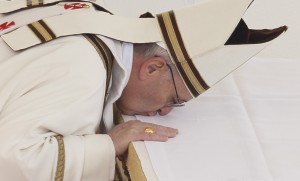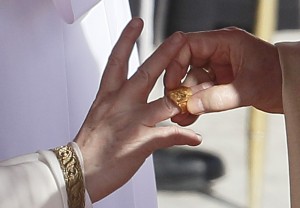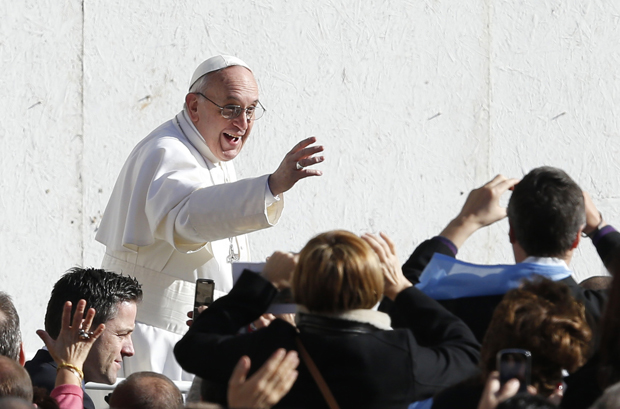
Pope Francis kisses the altar as he leaves after celebrating his inaugural Mass in St. Peter’s Square at the Vatican March 19. (CNS photo/Paul Haring)
VATICAN CITY (CNS) — Although attempts were made to simplify the ceremony, Pope Francis officially inaugurated his ministry as pope and bishop of Rome in a liturgy filled with biblical symbolism and signs of the universality of his mission.
(See a photo gallery with scenes from the pope’s first week in his new ministry.)
But before the solemn rites began March 19, Pope Francis — known for choosing public transport over chauffeur-driven limousines — took his first spin in the popemobile, blessing the tens of thousands of people who arrived in St. Peter’s Square as early as 4 a.m. to pray with him. He waved and, at one point, gave a thumbs up to the faithful. He also kissed three babies held up to him by the chief of Vatican security, Domenico Gianni, and other officers.
But he climbed out of the open jeep used as a popemobile to kiss a severely disabled man.
[hotblock]
Before entering St. Peter’s Square, he addressed by satellite thousands of his fellow Argentines gathered in Plaza de Mayo in Buenos Aires, where he had been archbishop before his election as pope. He thanked the people for their prayers and told them: “I have a favor to ask. I want to ask that we all walk together, caring for one another … caring for life. Care for the family, care for nature, care for children, care for the aged. Let there be no hatred, no fighting, put aside envy and don’t gossip about anyone.”
As the Mass began, tens of thousands of pilgrims, faithful and tourists continued to arrive, filling St. Peter’s Square and crowding around the large video screens placed along the boulevard leading to the square. By the time of Communion, the Vatican said there were between 150,000 and 200,000 people present.
In his homily, Pope Francis asked prayers that he would be able to protect the church like St. Joseph protected Mary and Jesus, “discreetly, humbly and silently, but with an unfailing presence and utter fidelity, even when he finds it hard to understand.”
He said in the Gospels, St. Joseph “can look at things realistically, he is in touch with his surroundings, he can make truly wise decisions.”
But more than anything, he said, the church’s patron saint teaches Christians that the core concern of their lives must be Christ.
“Let us protect Christ in our lives, so that we can protect others, so that we can protect creation,” Pope Francis said.
He called for special efforts to protect “God’s plan inscribed in nature” and to protect one another, especially children, the aged, the poor and the sick.
Although according to church law he officially became pope the minute he accepted his election in the Sistine Chapel March 13, Pope Francis received important symbols of his office just before the inauguration Mass — the Book of the Gospels, the ring of the fisherman, St. Peter, and the pallium, a woolen band worn around the shoulders to evoke a shepherd carrying a sheep.
With members of the College of Cardinals dressed in gold gathered before the main altar in St. Peter’s Basilica and brass players sounding a fanfare, the rites began at the tomb of St. Peter. Pope Francis venerated the mortal remains of his predecessor as head of the church and was joined there by the heads of the Eastern Catholic Churches.
Processing behind the Eastern church leaders and the cardinals, Pope Francis — wearing a simple, mostly white chasuble and his black shoes — came out into St. Peter’s Square while the choir chanted a special litany to Christ the King.
French Cardinal Jean-Louis Tauran, who had announced Pope Francis’ election to the world six days earlier, placed the pallium, which had been worn by Pope Benedict XVI, around the new pope’s neck. The retired pope did not attend the Mass.
“The Good Shepherd charged Peter to feed his lambs and his sheep; today you succeed him as the bishop of this church to which he and the Apostle Paul were fathers in faith,” Cardinal Tauran said.

Pope Francis, left, receives his ring from Cardinal Angelo Sodano, dean of the College of Cardinals, during his inaugural Mass in St. Peter’s Square at the Vatican March 19. (CNS photo/Paul Haring)
Italian Cardinal Angelo Sodano, dean of the College of Cardinals, presented Pope Francis with the fisherman’s ring, a gold-plated silver band featuring St. Peter holding keys, a reminder that Jesus told St. Peter: “I will give you the keys to the kingdom of heaven. Whatever you bind on earth shall be bound in heaven; and whatever you loose on earth shall be loosed in heaven.”
Giving the pope “the ring, the seal of Peter the fisherman,” Cardinal Sodano told the pope he was called, as bishop of Rome, to preside over the church with charity. He prayed the pope would have “the gentleness and strength to preserve, through your ministry, all those who believe in Christ in unity and fellowship.”
Six cardinals, representing the entire College of Cardinals, publicly pledged obedience to the pope.
While many Christians acknowledge the special role of the bishop of Rome as the one who presides over the entire Christian community in love, the way the papacy has been exercised over the centuries is one of the key factors in the ongoing division of Christians.
For the first time since the Great Schism of 1054 split the main Christian community into East and West, the ecumenical patriarch attended the installation Mass. Patriarch Bartholomew of Constantinople, first among equals of the Eastern Orthodox, sat in a place of honor near the papal altar.
Catholicos Karekin II of Etchmiadzin, patriarch of the Armenian Apostolic Church, also attended the Mass along with delegations from 12 other Orthodox and Oriental Orthodox churches, 10 Anglican and Protestant communities and three international Christian organizations, including the World Council of Churches.
After the Lord’s prayer, Pope Francis exchanged a sign of peace with Patriarch Bartholomew and with Catholicos Karekin.
The Chief Rabbinate of Israel, the Jewish community of Rome and several international Jewish organizations sent representatives to the ceremony, as did Muslim, Buddhist, Sikh, Jain and Hindu communities and organizations.
Also present were representatives of 132 governments, led by the presidents of Italy and Argentina, the reigning royals of six countries — including Belgium’s king and queen — and 31 heads of state. Vice President Joe Biden led the U.S. delegation while David Lloyd Johnston, governor general, led the Canadian delegation.
PREVIOUS: Pope Francis begins papacy pledging to protect church, human dignity
NEXT: Changes in style send clear message from Pope Francis




Share this story